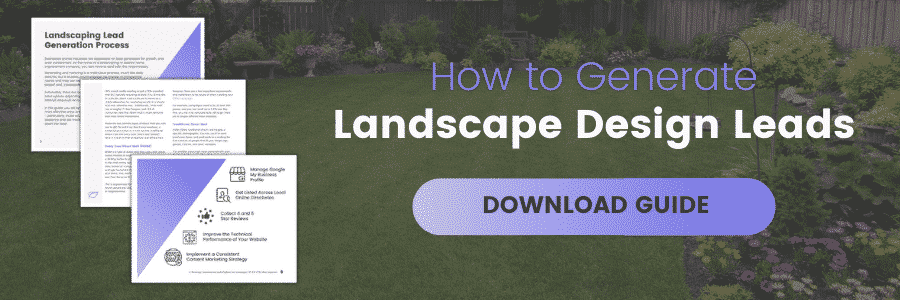
[10 Examples] How to Respond to Negative Reviews for Your Landscaping Services
Posted Dec 1, 2021 | Updated 2 years ago
Giving customers the chance to leave online reviews can be a powerful tool for your landscaping company. From highlighting your services and giving valuable insight to other property owners in the area to improving your search engine optimization, there’s a lot to be gained.
However, you can’t guarantee that all feedback will be positive. Sometimes, you have to take the bad with the good. While that can be a bit nerve-wracking—not being able to control what people write about your company in such a public space—you can turn it into an opportunity to exhibit excellent customer service, improve communication, clear up misunderstandings and even repair damaged professional relationships.
Why Should I Respond to Negative Online Reviews?
If you are advertising or listing your landscaping design business on Google, HomeAdvisor, Yelp or other platforms, you have to be prepared to monitor your profile. Customers also tend to use Facebook for writing reviews of local companies.
When you get a negative review on your Facebook page or Google profile, it can be tempting to simply ignore it or not engage, especially if it seems personal or mean-spirited. But ignoring a review won’t make it go away. In fact, it can make the problem worse.
Not responding can make your landscaping team appear out-of-touch, apathetic and unprofessional. After all, customers are at the core of your company. If you give off the impression that you don’t care about their concerns or opinions, others who are considering your company for landscaping services may get the wrong impression. Keep in mind that your responses are not only for the benefit of the person who left the review, but everyone else perusing your online profile while searching the web for landscaping design options.
How to Respond to Negative Reviews
If an online review is false or inaccurate, you can attempt to get it deleted entirely, but it’s not always a simple process when you’re not the original poster. On Google, you flag the post, which alerts moderators that the review doesn’t comply with their policies or is fake. Most of the time, nothing is done to remove the review, however. Yelp also allows you to flag reviews with false information. However, you’ll have to wait for moderators to review the problem, and even then, there’s no guarantee the original post will be taken down.
More often than not, customers will come with genuine complaints. When they do, you’ll want to respond to online reviews quickly and strategically in a way that’s professional, personal and polite. Here are a few steps to help you do that, enabling you to preserve your public perception and even leverage negative reviews as marketing opportunities:
1. Apologize and Take Responsibility
Empathizing with someone is the first step to resolving conflict—whether personal or professional. Even if you have a different side to the story, or it appears there was a misunderstanding, Google and Facebook aren’t the right platforms for pushing back. The heart of your response should be showing that you understand. Offer a sincere apology and take responsibility for the mistake.
Here are a few examples of what you could say:
- “We’re sorry to hear that you had a negative experience doing what should have been an exciting and positive home improvement project. We’d like to opportunity to make it right. Please give us a call at [NUMBER].”
- “We take this type of unprofessionalism very seriously. We apologize for putting you in this position. Please give us a call at [NUMBER] to further discuss this matter.”
2. Offer to Make it Right
The next step is to right the wrong, if you’re able to. For example, if someone is complaining about an improper installation, you can respond:
- “We’ll schedule a team member to come look at the issue at your earliest convenience. We look forward to working with you to make sure your residential space is ready for you to properly enjoy in the coming years.”
If the project is already complete, and the customer is upset about how long it took or a miscommunication that occurred during the process, you might not be able to fix it, per se. But you can still offer solutions, such as:
- “We appreciate you taking the time to let us know about your experience. We’d love to get more information so we can improve our process and prevent a similar occurrence in the future.”
- “While we unfortunately can’t improve your past experience, we’d appreciate a chance to give you a better one in the future. Please accept a [DISCOUNT] on your next project.”
3. Ask to Talk In-Person
Ultimately, you don’t want to create a situation with lots of back-and-forth dialogue on Yelp, HomeAdvisor or another listing site. It doesn’t look professional, and there’s a risk you’ll perpetuate misunderstandings. It can be difficult to read tone online. Try to move the conversation offline so you can have a more honest and effective dialogue. This act of opening the door is a positive indicator to prospective customers that your company is genuinely interested in listening.
Some examples include:
- “Thanks for bringing this to our attention. We’d value the opportunity to speak with you more in-depth about your experience. Please give us a call so we can figure this out with you.”
- “If you could give us a call at [PHONE NUMBER] or email us at [EMAIL ADDRESS], we will be in touch as soon as possible to get more information about your experience.”
4. Integrate Subtle Marketing
If it’s appropriate, you can try to work in some positive phrases about your company, services or performance to give other viewers a better understanding of your brand. Here are a few examples:
- “We have developed a reputation for the timely delivery of services, so it is disappointing to hear we did not live up to that commitment on your project.”
- “While we have worked for years to refine our landscaping design process, there is always room for improvement. Your valuable feedback will allow us to do just that.”
- “We put a high priority on providing landscaping services that add value to your property and enrich your quality of life. Clearly, we missed the mark, and we’d like the opportunity to make it right.”
Managing Your Company’s Online Presence
You can’t control what people write about your business online. While the raw, authentic nature of reviews can benefit your landscaping design business, you occasionally have to deal with negative feedback as well. However, when handled properly, you can turn these incidents into opportunities to make things right and demonstrate publicly that you’re a company that has integrity and genuinely cares about your customers.
For assistance with managing your digital presence and integrating more effective SEO strategies and practices, you can turn to our team at Third Angle. We offer an array of tools and solutions to help you optimize your online marketing and how you reach out to and interact with customers.

